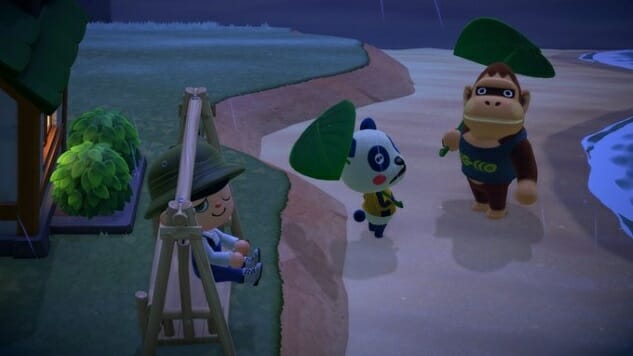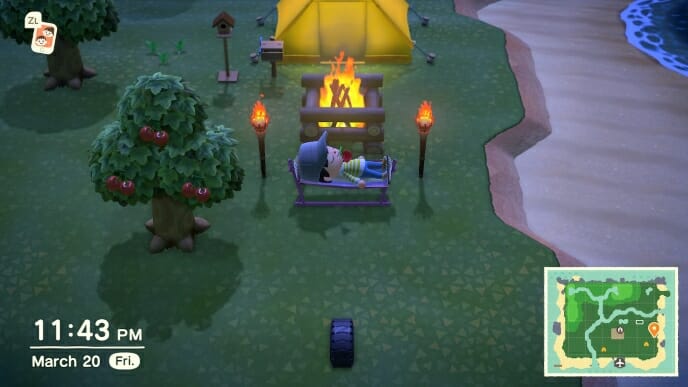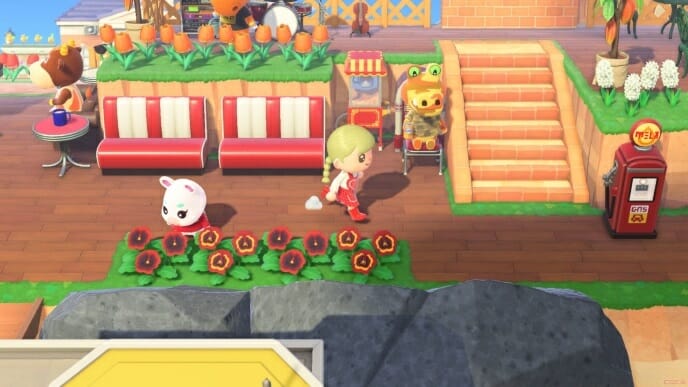It’s Not the Virus but the Entire Last Decade that’s Made Animal Crossing: New Horizons So Popular

I don’t know any of my neighbors. I’ve lived in this house for seven years and I can name two other people in this subdivision: Ed, the old guy from the Bronx who decorates his house for every single holiday, no matter how minor (when the quarantine started, he had his St. Patrick’s Day lights up; now he’s on to Easter); and Chuck, the guy with the great lawn, the El Camino and the post-retirement job at Trader Joe’s. I’ve had maybe four conversations with either of them, ever. My wife and I call our neighbors things like Dachshund Dad, Great Dane Dude, the Golden Jogger, the Superpatriot. The closest we come to a relationship is the occasional wave. This isn’t a community—it’s just coincidence.
Meanwhile every single day I talk to this meathead gorilla who only ever talks about squats and lifting. Every day and multiple times a night. As much as possible. I hate him and he is my best friend—or one of six best friends who all live on this tiny island with me. When the rain starts to pour, like we’ve been there before.
Animal Crossing: New Horizons hasn’t assumed the place of our real-life neighbors because of the coronavirus. That might drive many of us to play it even more than we already would, but it doesn’t explain the ineluctable allure at the game’s heart. New Horizons is my new de facto home because, despite its calculated weirdness and absurd flights of fancy, it makes sense. Even before the virus real life didn’t make a damn bit of it. At this point reality isn’t something to be escaped from, but something barely tolerated at worst and flagrantly rejected at best. Reality is patently unreal. When the swarms of misinformed people who refuse to recognize science, facts and expertise hit a critical mass, the balance shifts to where what is real is no longer truly real, and we hit that tipping point some time before 2015, at the latest. The massive success of New Horizons attests to today’s core deficiency: this ridiculous cartoon world and its talking animals who trade bells with each other for basic goods and services is more mundane than the world outside my door. We all yearn for the normalcy of a panda neighbor who spends all day twirling in the weeds with his leaf umbrella.

Animal Crossing is relaxing, but it isn’t. It’s stressful when it’s not. It’s a stack of checklists stapled together, a series of only lightly suggested expectations whose most tangible reward is simply knowing that you met them, but that are always dangling right above you. It’s a clipboard, but cute. Animal Crossing means always having something to do but no need or reason to ever do anything.
It’s a game with multiple currencies. You buy the same basic items with them. They’re liberally doled out just for participating. You can dig up a hole and get both bells and Nook miles at the same time. Money literally grows on trees, and yet some people still complain about the game’s inherent embrace of capitalism. I could pay for my house in this game by selling just under 200 peaches—or 12 tarantulas. These animals have no idea how to run an economy. And yet it still makes more sense than what’s happening outside my real house.
New Horizons cedes too much responsibility. It lets me make all the decisions, and my entire life has been devoted to making as few decisions as possible. Freedom from choice is what I want. I don’t want to make an impact on this world. I don’t want to make an impact on any world. I just want to visit it, explore it, befriend a penguin in it. I don’t want to have to tell that penguin where to live. Live your own life, penguin! You’ve earned it.
I don’t want to be a city-planner. There are games for planning cities. They’re named things like Cities, CitiesXL and CitiesXXL. Proud names that let you know exactly where you stand—in a city. I’m just here to cross the animals. Let their city build itself.
But say you want to get out of the house. You can get out of your Animal Crossing house whenever you’d like. You can hunt down bugs or go fishing, chop down trees or pick fruit, hang out with your neighbors or temporarily fly to new, undiscovered islands and hopefully meet a new friend. You can do all of this or none of it. You can sway in a hammock next to a bonfire and overlook the ocean for hours at a time. You can wish on a falling star and then pick fragments of it off the beach the next morning. Games are about actions, guided by thoughts, and Animal Crossing: New Horizons is fully compatible with that overly pat description. Never give the “not a game” crowd an inch.

Talking to the animals is still a joy. Inviting real-life friends over to visit your island, at a time when we can’t do that in the real world, can feel exhilarating, even with limits on what you can do together. Donating to the museum runs on the twin engines of labor and environmental exploitation that underpins almost every transaction on the island, but at least your work results in a perpetual experience that can be shared by all. This is all good. This is all fine.
In the original Animal Crossing you could find NES games hidden throughout the village. You’d dig them up out of the ground like the fossils they were, or find them in the town dump. You could then sit and play them in your house for as long as you’d like. You could wake up and turn on your Nintendo and then turn on the Nintendo within the Nintendo and play Excitebike for hours and then go back to sleep. You had that freedom.
Nintendo dropped that feature when they realized they could sell those old NES games for five bucks a pop. That’s the point when Animal Crossing shifted—when it went from letting you exist to making you control. Almost everything you do in New Horizons has the residue of productivity on it, even if you’re trying to be as aimless as possible. Instead of playing games within this game, the only way to not accidentally be productive is to literally do nothing—to sit in a chair, or lay on a hammock, and put the controller down. To sit quietly with your own thoughts—thoughts that exist fully outside of your Nintendo Switch.
The fact that you can do that, though, is an example of the confidence within Animal Crossing: New Horizons. Nintendo might have ramped up the numbers and the to-do lists, all the tasks and chores that make New Horizons feel like one of the last outposts of whatever notions of normalcy we might’ve once had, but you can still tune that out and live within your own head for a spell. That head might naturally drift towards the hellishly contorted world we live in, and not the delightfully cartoonish one of Animal Crossing, but escapism is overrated anyway. I’d rather worry about every aspect of modern living while quietly reflecting on the rhythmic roar of a videogame ocean than while sitting slackjawed in a living room I won’t ever be able to leave again. Give me these New Horizons—rigid, commercial, and staid—over the chaos of the last decade.
Animal Crossing: New Horizons was developed and published by Nintendo. It’s available for the Switch.
Senior editor Garrett Martin writes about videogames, comedy, travel, theme parks, wrestling, and anything else that gets in his way. He’s also on Twitter @grmartin.